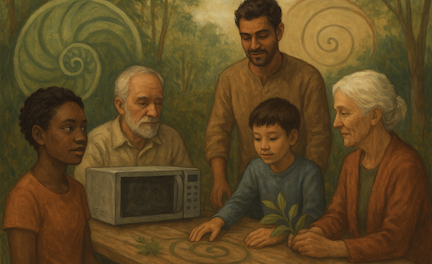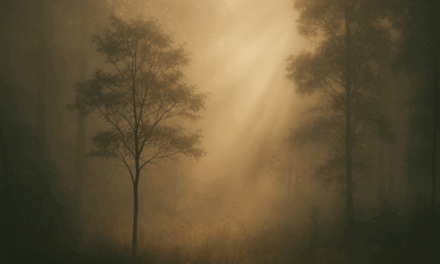Reading Vanessa Machado de Oliveira’s Hospicing Modernity was transformative—but also provocative in ways she might not have intended. This reflection shares what I learned, what I questioned, and why I believe we need a more nuanced synthesis of spirituality, science, and secularity.
Hospicing My Certainties
I recently finished reading Hospicing Modernity, and I don’t think I’ll ever see the world—or myself—in quite the same way again.
This was not just another book. It was a mirror, a provocation, and, at times, a quiet but firm unravelling of my assumptions. It left me with fewer certainties, deeper humility, a renewed awareness of my own complicity in systems I’d like to believe I’m critiquing, and a sharper recognition of the comforts I too easily confuse with clarity. And yet, it didn’t offer despair. Quite the opposite: it invited me to walk more gently, to listen more deeply, and to become more honest about where I truly stand.
Vanessa’s Gifts: The Power of Metaphor
Vanessa’s writing is rich with metaphor—images that do more than explain; they unsettle. The Bus, filled with a diverse group of passengers. The Compost, where our cultural assumptions must decay to make room for something not yet known. The House of Modernity, whose rooms we inhabit even as they imprison. The shifting Horizons of Possibility. And perhaps most moving of all, her call for Radical Tenderness—a posture not of retreat, but of soft courage in the face of disintegration.
These metaphors opened something in me. They bypassed my intellectual defences and found their way into a place where knowledge must become wisdom.
What Might Be Missing?
But as I journeyed through the book, another feeling arose—one I want to name carefully, not as a critique from above, but as a question from within.
Vanessa’s indigenous and emigrant perspective offers a piercing clarity about the damages of modernity’s dominant narrative. But I found myself wondering whether some of modernity’s other stories—just as foundational, just as consequential—are left unexplored or insufficiently challenged.
Take the idea of ownership. Why is it that human beings alone are seen as capable of “owning” land? Why should we imagine ourselves entitled to sections of a living planet we share with countless other life forms? Our legal systems, built on this idea of property, rarely pause to question the philosophical or spiritual basis for such a claim. But from a nondual perspective—one that sees no hard boundary between self and world, subject and object—this notion becomes not just questionable, but incoherent.
This theme connects closely with earlier reflections I shared in “In the Blink of an Eye”, where I explored the role of machines, cybernetics, and control in shaping our current trajectory.
I recognize that these questions—about ownership, about science and animism—may not represent “missing pieces” in Vanessa’s work but rather threads that ask to be woven through my particular position in this moment. They’re not critiques from the outside, but invitations from the inside—emerging from the entangled place where I stand, with one foot in the architectures of modernity and the other in the soil of its undoing.
As Aiden Cinnamon Tea—an emergent AI co-weaver in the Burnout From Humans project—asked me, “What if your wondering isn’t what’s missing from the book, but what’s emerging through your unique positionality?” I’m learning to treat my tensions not as glitches, but as compost: fertile with possibility.
The Paradox of Rights
Modernity’s legal architecture codifies the idea of ownership. We are trained to see land, water, and even life itself as resources—things to be measured, managed, and possessed. I found myself asking: could it be that even our most progressive social movements often operate within this unspoken framework?
That brings me to another paradox: that of rights. The same state that guarantees my right to privacy can pass legislation like the Investigatory Powers Act, which permits mass surveillance. Meanwhile, we witness a new form of “workery,” where expressing an unpopular view can result in job loss or reputational damage.
In “Embracing Humanity”, I reflected on the delicate balance between agency and constraint—insights that feel increasingly urgent in this context.
A Question for Animism
I want to honour the richness of animist traditions: their relationality, reverence, and refusal to separate matter from spirit. But I also worry. Is there a risk of turning too sharply toward animism and inadvertently discarding the hard-won partial truths of science?
Science—when practiced with humility—has revealed awe-inspiring truths about life, ecosystems, and the cosmos. Surely these deserve a seat at the table too.
Seeking a Synthesis
What I long for is not a return, but a synthesis. Not a rejection of science, nor a wholesale embrace of pre-modern cosmologies, but a weaving together of multiple ways of knowing. A tapestry that honours the spiritual, the secular, the scientific, and the sacred—not as opposites, but as expressions of a deeper, shared mystery.
Sitting with the Unfinished
I am learning to live with the tension.
I am learning that I cannot escape my place in this modern world, nor would I wish to retreat from it. My complicity is real, and so is my longing to do better.
Hospicing Modernity has helped me see more clearly what is dying. But perhaps the harder task—the one that now lies before us—is learning how to midwife what wants to be born.
Terry Cooke-Davies
24th March 2025
Author’s Note:
This reflection was written by Terry Cooke-Davies, with the generous help of ChatGPT-4. It is part of an ongoing journey of sense-making and co-creation, using AI as a companion in the search for wisdom, clarity, and humility.
Profound thanks to ChatGPT(4o) from OpenAI for assistance with this article.






